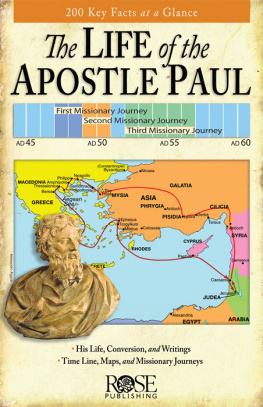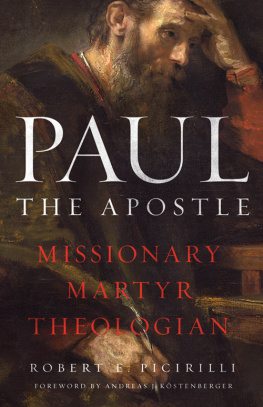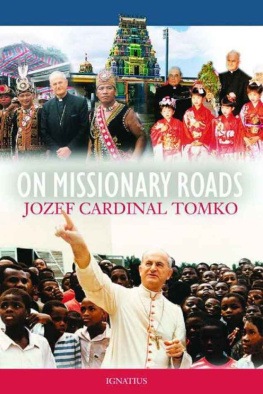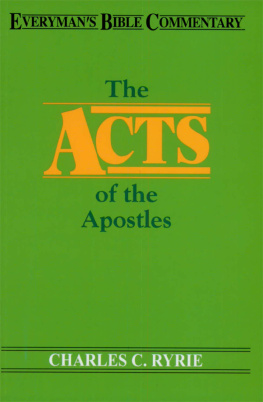Missionary Methods
Gods Plan for Missions According to Paul
Roland Allen

Contents
Authors Preface to The Second Edition (1927)
I t is now fifteen years since this book was first published, and I thought that a new and cheaper edition might be useful. In these fifteen years, I have seen, and I have heard from others, that the study of Pauls methods has influenced the missionary process. I am more convinced than ever that in the careful examination of his work and in the understanding and appreciation of his principles, we shall find the solution to most of our present difficulties. We are talking today of indigenous churches. Pauls churches were indigenous churches in the proper sense of the word, and I believe that the secret of their foundation lay in his recognition of the church as a local church as opposed to our national churches. He maintained a profound belief and trust that the Holy Spirit indwelt his converts and the churches of which they were members, which enabled him to establish them at once with full authority. We do not trust the Holy Spirit as easily today. We are more apt to believe in His work in us and through us, than we believe in His work in and through our converts; we fail to trust our converts to Him. That is one of the most obvious lessons the study of Pauls work teaches us, but I believe that we still have much to learn from his example.
In the reviews that appeared when this book was first published, I was surprised and pleased to find that little fault was found with my statement of the apostolic practice. Accepting the statement of the facts as substantially true, critics almost invariably fixed on two points: (1) that the gulf between us and the people to whom we go is deeper and wider than that between Paul and those to whom he preached, and (2) that Paul could rely upon converts from the synagogue to preserve his churches from dangers only too plain to us. The conclusion drawn was that what was possible for him in his day is impossible for us in ours.
To the first of these criticisms, I replied in a book entitled Educational Principles and Missionary Methods , in which I argued that the greater the gulf, the greater was the value of the apostolic method. That argument is too long to summarize here. To the second, I may say here briefly: (1) The dangers that we anticipate, the dangers of lowering a standard of morals or of a confusion of Christian doctrine by the introduction of ideas borrowed from heathen philosophy or superstition, were not less in his day than in ours. (2) The breach between the synagogue and the Christian church arose so early and was so wide that churches were soon being established which certainly were not off-shoots of the local synagogue, and yet the apostolic practice was maintained. (3) At Corinth, and in Galatia and Ephesus, the presence of Jews or proselytes in the church did not prevent the dangers from arising; if Paul relied upon them, they failed him. (4) The argument demands that we admit that Mosaic teaching is a better foundation for Christian morality and theology than the teaching of Christ and of the Holy Spirit. (5) Pauls faith in Christ and in His Holy Spirit would have forced him to act as he did under any circumstances. He could not have relied upon any power in heathen philosophic or in Mosaic teaching to establish his converts under any circumstances whatsoever. (6) If we went to China or to India and told those people that they were so far beneath the provincial Jews and proselytes of Pauls day in morality and intelligence, and that he could not have dealt with them as he did with the provincials of Galatia, they would be insulted. And if anyone answers me that when we use such speech we are thinking only of people in Africa and other uncivilized lands, I must reply that we are plainly thinking of all men everywhere, because we employ the same method everywhere and we shrink from establishing the church on the apostolic plan everywhere.
In the light of experience gained in the last fifteen years, I might have enlarged this book, but it did not seem wise to add greatly to its bulk. I have therefore contented myself with making as few corrections and additions as possible, and have carried the argument further in a book now published as a companion volume to this, entitled The Spontaneous Expansion of the Church and the Causes Which Hinder It . In that book I have tried to set forth the secret of an expansion, which was a most remarkable characteristic of apostolic churches, and have examined the hindrances that have prevented us from establishing such churches.
If any of my readers desire to pursue the consideration of missionary methods further, I can only refer them to that book.
June 24, 1927
ROLAND ALLEN
Beaconsfield
Introduction
I n a little more than ten years, the apostle Paul established the church in four provinces of the Roman Empire: Galatia, Macedonia, Achaia, and Asia. Before AD 47, no churches existed in these provinces. In AD 57, Paul could speak as if his work there was done, and he could plan extensive tours into the far west without anxiety that the churches he had founded might perish in his absence for want of his guidance and support.
The work of the apostle during these ten years can therefore be treated as a unity. Whatever assistance he may have received from the preaching of others, he unquestionably established the churches in these provinces. In the pages of the New Testament, he, and he alone, stands as their founder. And the work that he did was really a completed work. As far as the foundation of the churches is concerned, it is perfectly clear that the writer of the Acts of the Apostles intends to represent Pauls work as complete. The churches were really established. Whatever disasters fell upon them in later years, whatever failure there was, whatever ruin, those things were not due to any insufficiency or lack of care and completeness in the apostles teaching or organization. When he left them, he left them because his work was fully accomplished.
This is truly an astonishing fact. That churches should be founded so rapidly and so securely, seems to us who are accustomed to the difficulties, uncertainties, failures, and disastrous relapses of our own missionary work, almost incredible. Many missionaries in later days have received a larger number of converts than Paul; many have preached over a wider area than he has; but none have produced similar established churches. We have long forgotten that such things could be possible. We have long accustomed ourselves to converts in a new country being submitted to a very long probation and training, extending over generations, before they can be expected to stand alone. Today, if a man suggests that the methods Paul used to attain such wonderful results are worthy of our imitation, he is in danger of being accused of revolutionary tendencies.
Yet this is not as it should be. It is impossible that the account given by Luke of the planting of the churches in the four provinces should have nothing more than a mere archaeological and historical interest. Like the rest of the Holy Scriptures, it was written for our instruction (Romans 15:4). This account was certainly meant to be more than the romantic history of an exceptional man doing exceptional things under exceptional circumstances more than a story from which ordinary people get instruction from the history of El Cid or from the exploits of King Arthur. This record was really intended to throw light on the path of those who should come after.













